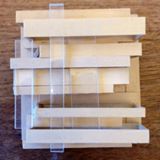Why I make
I make because I want to have greater control over my creative works.
s an architect, I find the act of architecture - the act designing and collaborating on the creation of a building - to be overly complex. Indeed, complex to the point of frustration. There is nothing unique in this; we are all frustrated with our chosen professions or careers at one time or another. What I'm referring to is the inherent conflict specific to the process of Architecture; it's in its very nature. The conflict can be what makes the process exciting. One works with clients, budgets, codes, and contractors - all various limitations that must be integrated into the architectural process and product. One's response to these 'limitations' is what often makes a project a success. One can see these 'limitations' as good things.
However, these limitations can, after a time, wear down the creative mind. For every client and contractor that works collaboratively, there are those that don't. And that lack of collaboration, of not seeing that we are all on the same team, is both frustrating and tiring. And for myself, the lack of control in this architectural complexity is not something I am that interested in to dealing with, perhaps because I find its results in all but the best circumstances unfulfilling. The compromises inherent in the architectural process can be too much given the efforts it takes to produce the final product. (Please note this is also why I am not a fan of cooking. The time it takes to cook typically outweighs the time it takes to eat thereby making the process & effort less than appealing).
And so, to be in more control of process, limitations, and the response to those limitations, I look to work at a smaller scale.
These days I find I am not sketching buildings or building designs nearly as as much I'm sketching furniture, and baskets, and pottery, and lamps...all objects that I can potentially make with my own two hands (with some tools and materials). This 'being made by my own hands' gives me a control over both the successes and the failures - and control over my response to both.
I was speaking with Jake Ryan yesterday about failure in the process of making. (Jake is the founder of the open bench project https://obportland.org/ in Portland, Maine). I was telling him that I like to work on my own. This allows me to make my mistakes in private. In this way, when I fail I can focus on the reasons behind the failure, and not be further encumbered by the potential embarrassment that comes along with the act of failing. I find it very rare that I get through a process without making multiple mistakes, just ask my kids.
But when I'm alone I can utter a quick swearword, stomp my foot, and move on beyond the failure towards the solution. Alone, I find it fairly quick to address the error and move on; in fact I can actually enjoy the failure as a testimony to my own learning. However, when I make mistakes while working with others it, and my actions somehow hinder their efforts or their timelines, then I carry the additional worry of bothering them. My feelings when making errors with others are compounded and overly complex (hmm... much like the architectural process). When I make errors alone, I can see them as learning opportunities, any feeling of upset I have is short-lived, and the work continues.
And so I find I want to make with my own hands. I want to engage projects where I don't need a partner or a team. I want to make and be in control of the ideas, the process, and the successes and failures.
A question: I'll have to think more on this because I really do like collaboration. How do I rectify my desire to work alone with my enjoyment of collaborating with others?

